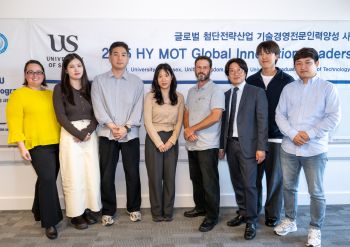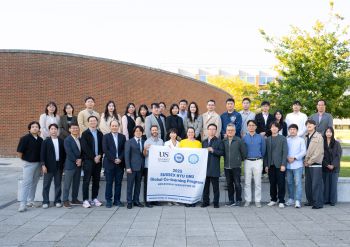Korean postgraduates join Business School for a week of innovation and global learning
By: Lauren Sarruf
Last updated: Thursday, 16 October 2025

Students from Hanyang and Gyeongsang National Universities at the University of Sussex campus

Bridging the UK and South Korea through innovation and learning at the Business School
In September 2025, the University of Sussex Business School welcomed 27 postgraduate students from South Korea for the inaugural Hanyang–Sussex Visiting Programme. Delivered by the Science Policy Research Unit (SPRU), the week-long initiative brought together students from Hanyang University and Gyeongsang National University to explore Science, Technology and Innovation – Advanced Policy and Management.
The programme was designed to strengthen academic and professional ties between the UK and South Korea, creating a platform for mutual learning, cross-cultural exchange, and collaboration in technology policy and management.
A week of insight and collaboration
Participants—Master’s students specialising in the Management of Technology—took part in a series of lectures, workshops, and group activities on topics including:
-
Innovation and sustainable development
-
Business negotiation and strategy
-
Biotechnology and entrepreneurial finance
-
Policy frameworks for science and technology
Sessions were led by SPRU faculty with contributions from guest speakers across the University of Sussex. Students also enjoyed a campus tour, field visits, and a final presentation session, during which they showcased the strategic proposals they had developed throughout the week.
Dialogue on the future of technology policy
The programme concluded with an expert panel discussion featuring academics from the University of Sussex and the visiting institutions. Together, they explored some of the most pressing questions in science and technology policy today:
-
How will industrial development evolve in the age of AI?
-
What role will hydrogen technology play in future energy systems?
-
How can policy support SMEs to compete globally?
-
What skills and mindsets will define the next generation of technology leaders?
These discussions reflected the programme’s forward-looking approach, encouraging students to think critically about global challenges and the role of innovation in addressing them.
Student reflections and impact
Feedback from participants was overwhelmingly positive. Students praised the quality of teaching, the relevance of the content, and the opportunity to learn from peers.
“The professor’s enthusiastic teaching and flawless schedule,” shared one participant.
“Fantastic discussion with Hanyang University and SPRU—I’m looking forward to joining again next year,” said another.
“The course was of excellent quality and provided many advanced insights to learn from,” added a third.
Students also reported enhanced understanding of global investment strategies, particularly in biotechnology, alongside practical policy insights for business development. Many noted improvements in communication, writing, and presentation skills, as well as a deeper understanding of how theoretical frameworks apply to real-world decision-making.
Strengthening international partnerships
Participants represented leading organisations including Samsung Electronics, Deloitte, and the Korea R&D Industry Association. Working in teams, they developed strategies for Korean firms seeking to engage with the UK innovation ecosystem.
The winning team proposed a national strategy to position Korea as a global leader in AI content trust and standards, drawing on frameworks such as transformative innovation policy and strategic niche management introduced during the course.
Reflecting on the week, Adrian Ely, Director of Policy Training & Executive Education at SPRU, said:
“It has been a pleasure and privilege to welcome our Korean colleagues to Sussex. The week provided a wonderful opportunity for mutual learning, and we look forward to deepening our partnership with these universities in the years ahead.”
Adding to this, Dr Youngha Chang, Associate Professor in Innovation Management, highlighted the growing importance of SPRU’s collaboration with Korea: “At present, nearly twenty Korean government officials and professionals in science and technology policy are studying with us. This visiting programme has further strengthened that connection, providing a meaningful opportunity for mutual learning and lasting impact.”
Following the success of this inaugural year, discussions are already underway to expand the programme with continued support from SPRU and its Korean partners.

